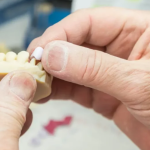A root canal procedure is now a painless dental process when performed by the specialists at Dental Associates of Morris County. It’s only done when the root of your tooth is dead, dying or beyond repair. Root canal therapy is a proven technique to save the tooth. Even without the pulp — the blood vessel, nerve and other tissue — your tooth can remain strong and serve you for the rest of your life.
Tooth pain can be debilitating, especially if it originates in the root of your tooth. It can be a throbbing or a stabbing pain. But pain that comes from the root of your tooth often means that the pulp has become infected and needs treatment.
Don’t ignore tooth nerve pain or control the pain with medication. If the cause is an infection, it can turn dangerous if left untreated. Call the pros at Dental Associates of Morris County, your Madison, NJ family dentists. A root canal procedure can save the tooth, permanently resolving your pain.
Your New Jersey restorative dentists have the skills and knowledge to painlessly perform root canal therapy. Their goal is to maintain your dental health. A root canal procedure is just another technique to keep you and your teeth healthy.
Causes of Tooth Nerve Pain
Most often, a toothache is caused by a cavity that just needs a filling. But if the damage is more severe or if the tooth is already weakened, a filling may not be adequate.
Only your dentist in Madison, NJ can determine if you need a root canal procedure, but some of the symptoms that may lead to a root canal include:
- Untreated and extensive tooth decay
- Intense tooth nerve pain
- A tooth abscess
- A tooth that looks darker than your other teeth, which indicates a dying pulp
- A dental crown that’s become loose or faulty
- A tooth that’s been broken, cracked or chipped, exposing its pulp
Do You Feel Any Root Canal Pain?
Your Morris County dentist performs painless root canal therapy. It starts with a topical numbing agent, followed by a shot of Novocain to deaden any root canal pain. Then:
- The dentist accesses the tooth pulp to remove the nerve, blood vessel, connective tissue and all infected material.
- After the tooth is flushed with a disinfectant or antibiotic, your tooth is cleaned and dried completely.
- In the root canal of the tooth, your dentist inserts a rubbery substance, then seals the tooth.
- Often, a crown is fitted over the tooth to protect it. You may receive a temporary crown while the permanent one is made. If so, you must return in several weeks to get the permanent crown.
You end up with an unnoticeable, completely functional, pain-free tooth that should give you years of use. Care for the crown as you do your other teeth.
An Easy Root Canal Recovery
You shouldn’t feel any pain after root canal therapy. You may feel temporary discomfort once the anesthetic wears off. You may experience temperature sensitivity, but that fades quickly. Your root canal recovery is like recovering from a filling. You can go right back to your normal daily routine the very next day.
Call your dentist if you notice any of the rare symptoms after your procedure that may indicate the need for a root canal retreatment, such as:
- Swelling in the area of your root canal procedure
- Any pain after root canal therapy after several days
- Continued pain that becomes more intense
- A reaction caused by allergies, such as hives or a rash
- An uncomfortable bite or issues with your crown
When You Need Root Canal Retreatment
If you have a crown problem, from either the temporary or permanent one, you may need to return to your dentist’s office for an adjustment. While that’s not a root canal retreatment, it does allow your dentist another look at his root canal work.
If an infection returns to the tooth, which is rare, then you may need a root canal retreatment. Sometimes, it happens no matter how well your New Jersey dentist cleans and disinfects the canal. Even without the nerve in the pulp, you feel the pressure. This pain after root canal therapy means you may need a root canal retreatment, which involves repeating the procedure.
Determining Your Root Canal Cost
If you’re asking yourself, how much does a root canal cost, the truth is there is no simple answer. Many factors influence your final root canal cost, including:
- Whether you need additional procedures
- If you’re so nervous, you want to take advantage of sedation dentistry
- How difficult it is for your dentist to reach the affected tooth
- Whether the infection has spread to other teeth or your gums and jaw
- Which type of crown you have your dentist put over the tooth, such as a:
- Porcelain crown
- Zirconia crown
- BruxZir crown
- eMax crown
Your dental insurance may cover the cost of your root canal procedure. Don’t avoid root canal therapy if you need it. The staff at Dental Associates of Morris County help by offering affordable root canals.
Resource: https://dentalofmc.com/restorative-dentistry/root-canal-procedure-in-madison-nj/



